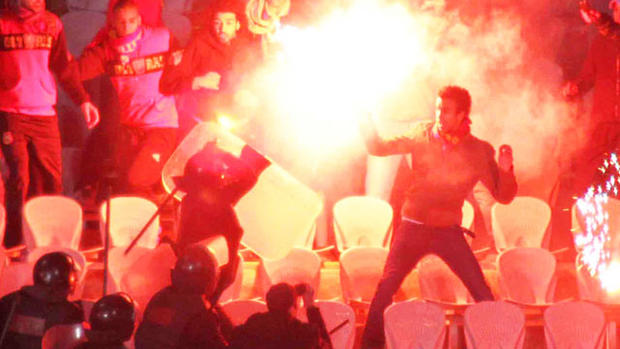Egypt soccer riot: Why don't Americans kill over sports?
The tragedy in Egypt, where a riot following a soccer game on Wednesday left more than 70 people dead, highlights what may strike many fans around the world as a curious fact of life in the U.S.: Americans generally don't kill each other over sports.
Why not? The answer is complex. It's not that violence at athletic contests is unheard of in this country. At a Major League baseball game last April, for instance, two Los Angeles Dodgers fans brutally beat a man wearing a San Francisco Giants jersey. Several months later, two people were shot outside San Francisco's Candlestick Park after a preseason NFL game between the local 49ers and the archrival Oakland Raiders. Fans here can also get downright ornery. So Jacksonville Jaguars players learned in December, 2001, when Cleveland Browns supporters pelted them with bottles and other debris over a controversial refereeing decision, forcing the game to be temporarily suspended. And any hockey fan brave (or nuts) enough to parade around in New York Islanders gear at a New York Rangers game in Madison Garden should bring an umbrella to guard against beer showers.
Egypt army, police blamed for soccer bloodshed
Gallery: Deadly Egypt soccer riotMajor soccer stadium disasters
Still, the U.S. has never seen the kind of lethal free-for-all witnessed in Port Said yesterday that followed an Egyptian league match between home team Al-Masry and Cairo's Al-Ahly. Nor, as this list of major soccer stadium disasters shows, has their been anything on the scale of the 96 deaths at an infamous 1989 soccer game in England between Liverpool and Nottingham Forest. And it is unthinkable that a game could spark an actual war, as a series of World Cup qualifying matches between El Salvador and Honduras did in 1969.
In addressing why sports-related violence is common in some countries and not in others, including the U.S., it's important to understand that games reflect the social, political, and economic tensions of the places where they are played. In a hotbed of political ferment like Egypt, clashes on the soccer pitch aren't games at all, but rather another forum for the kind of hostilities currently refacing society.
For instance, hardcore Al-Ahly fans known as "Ultras" (a name originally used to describe the rabid, often violent "hooligan" groups that support professional soccer teams in South America and Europe) were heavily involved in the Tahrir Square demonstrations last year that led to the downfall of former president Hosni Mubarak. Critics are also pointing fingers at the Egyptian police and military for failing to stop the mayhem, with some suggesting that the country's military leaders may have allowed the riot to escalate as a pretext for consolidating their grip on power.
In short, organized sports as it is played around the world is often explicitly political. While there may be something of a blue-red state divide in the rivalry between professional franchises in, say, New York and Texas, Yankees and Rangers fans are unlikely ever to to throw down over the forthcoming presidential election.
Yet that is exactly what happens in a country like Argentina, where sports and politics are deeply intertwined. As two sociologists who have studied the subject write, "[W]hat is distinctive about Argentina is that sport and politics are inextricably linked. [Soccer] is an extension of politics; it is part of the political system, and anything that begins as a sports issue rapidly becomes politicized."
In the U.K., by contrast, soccer culture is defined more by class (although right-wing political movements, such as the National Front, have sought to align with some clubs). Fans that support teams from traditionally working-class districts in London's East End, such as West Ham United and Millwall, to this day ridicule the "posher" cultural identity of fans of teams like Chelsea, which is situated in the city's more upscale West End.
Even a team's ownership plays into that dynamic. Manchester City, which currently tops the top-flight Premier League in England, is often mocked for being controlled by an United Arab Emirates oil billionaire, while Chelsea is derisively dubbed "Chelski" for its ownership by Russian businessman Roman Abramovich. With professional soccer (or football, as it's called just about everywhere but in the states) in Britain dating back to the 19th century, this influx of big "foreign" money in the game is regarded as vulgarly arriviste. Not so in the U.S., where a mogul like Mikhail Prokhorov, owner of the NBA's New Jersey Nets, is welcomed as a savior.
Soccer violence in other countries may also be rooted in religious differences. In Glasgow, Scotland, for example, fans of Rangers typically are Protestant, while backers of the team's main foe, Celtic, are usually Catholic. The threat of violence, tinged by Scotland's long history of sectarian conflict, is always in the air when the "old firms" clash. Religious-themed discord in soccer also has flared in Northern Ireland.
In the U.S., by contrast, games remain games. However bitter the rivalry, professional sports still mostly function as a refuge from everyday concerns, rather than a place to act out out social frustrations, fly political banners, or perpetuate age-old feuds. In part, that may be because most Americans don't define themselves by class, as polls indicate. Teams here also aren't religiously identified, even at the college level at Catholic institutions like the University of Notre Dame. Fighting Irish fans come in all creeds and colors, an echo, perhaps, of the freedom of religion on which this country is based.

